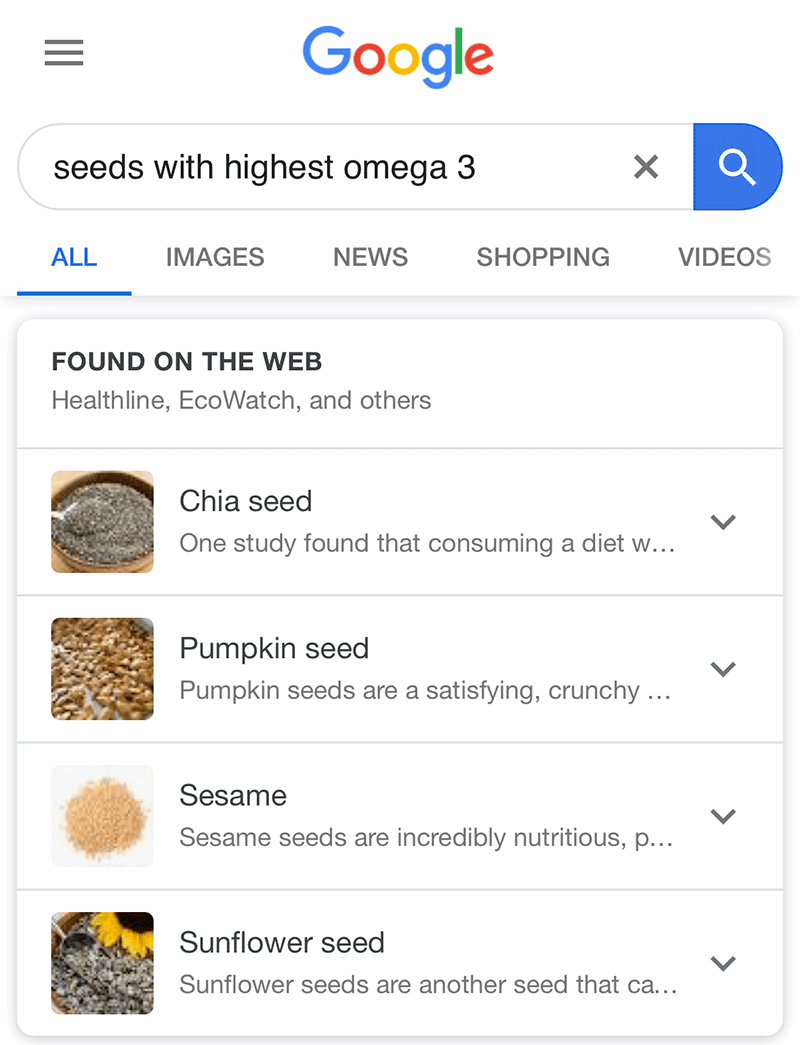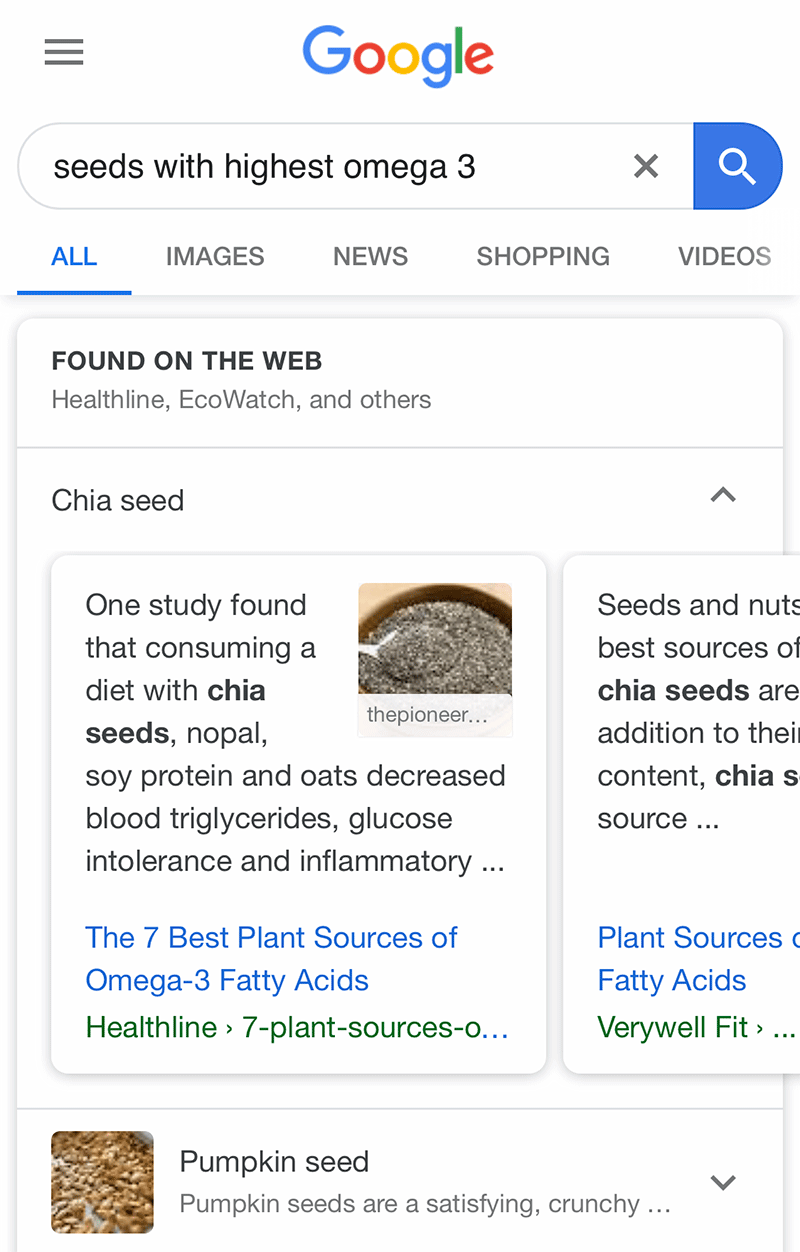Controversy over Google Featured Snippets stealing publisher traffic reignites
Google said it will take feedback into consideration.
This weekend, Google responded to complaints about a form of featured snippet that does not immediately show the source of the content. Instead, it requires a searcher to click to expand the featured snippet and then scroll through various sources to see the publisher sources. The controversy around featured snippets and publishers is not new but it reignited with this result format.
The controversial featured snippet. Zyppy.com founder Cyrus Shepard posted a screen shot on Twitter of a “Found on the web” card of snippets:
This snippet format is not particularly new; it has been around for some time, and doesn’t look far off from this variation from years ago. But you can see the “Found on the web” references sites from Healthline, EcoWatch “and others” at the top of the card. It does not specifically link to the content at first, you need to first click into each type of seed to see a carousel of search results that are related to the query. When you click to expand, then you get multiple search results to click on.
Here is the screen shot of an expanded result:
The complaint. As Cyrus Shepard put it, Google is (a) “taking the copy of many third-party publisher to create its own independent web page” and (b) there is “zero visible on-page links to the publishers who provided the data.”
This is an incredible search result from Google:
• Answers a fairly complex question
• Takes the copy of many 3rd party publisher to create its own independent web page
• Zero visible on-page links to the publishers who provided the dataThis is the future of Google Search pic.twitter.com/txNU2Z7HB5
— Cyrus SEO (@CyrusShepard) February 23, 2019
Some publishers feel that Google is taking their content, placing it on its own web site, not adequately sourcing and linking to the original content. It is almost exactly like the same controversy when Google first launched featured snippets in the search results in 2014.
Many said they share Shepard’s frustration with this type of treatment.
As this becomes the future, an interesting thing happens… the value of creating useful, accurate content for the web diminishes, b/c while publishers do the work, Google alone gets all the benefits. Their trojan horsing of the web is subtle, but damned effective. https://t.co/dydWQSbUju
— Rand Fishkin (@randfish) February 23, 2019
Certainly website owners do not appreciate it and that could lead to issues for Google on a few levels.
— John Lincoln (@johnelincoln) February 25, 2019
Not really. If Google is providing no link or traffic, site owners won’t care.
They might even block Google if they aren’t getting anything out of it.
Great time for @Bing to up it’s game or @DuckDuckGo to grab some real share.
— Kristine Schachinger (@schachin) February 24, 2019
Interesting how even the images used don’t get attribution until expanded (and often cut off).. pic.twitter.com/koFiXXnsaI
— Britney Muller (@BritneyMuller) February 25, 2019
Clearly, many in the SEO community are not too happy with this new form of featured snippets.
On the flip side. Yet others feel that in these query cases, Google has found a good way of showing multiple sources without overburdening the searcher with too much information at first.
As illustrated with the full set of screen shots above, Google does show the source after you do click and expand the results:
https://twitter.com/henshaw/status/1099490300421115905
Google also does show “Healthline, EcoWatch and others” as the source above the featured snippet section.
Google’s defense. Danny Sullivan, Google’s Search Liaison went to Twitter to defend Google’s actions here. He responded to numerous complaints on Twitter.
Since I got asked about this, a couple of things.
Most important, the future of Google Search is to continue supporting the ecosystem. We don’t thrive & users don’t thrive unless the ecosystem thrives.
I wrote about this last year….https://t.co/S7Es57l7fW
And…. pic.twitter.com/U5T95FYPKM
— Danny Sullivan (@dannysullivan) February 23, 2019
Danny Sullivan explained that what is more important to Google Search is to support the overall ecosystem, that includes both searchers, advertisers and publishers. If Google doesn’t treat any of those players properly, then Google won’t succeed. This topic comes up at Google’s internal meetings all the time, Danny said. He said it is a “front-line concern with everyone involved with search” at Google.
But search has to evolve as the web evolves, he added. Google is constantly testing new search features, coming out with new search formats and with that brings concerns as well as opportunities, he said. In this specific case, he said, the featured snippet doesn’t show a specific and single independent web page. Google here is giving searchers a way to explore answers for the query from many different sites in a cramped mobile search interface.
He then referenced the debate when featured snippets first launched in 2014 and how even he, as an independent search analyst, felt it would harm publishers. He said he was wrong, and that it did the opposite, sending “lots of traffic” to publishers. With that, he hopes that new features Google releases do the same and continue to “support the ecosystem.”
Sullivan did say he would “pass along the concern that it might be better if these showed a link for the first site being quoted or perhaps the carousel was opened for the first listing.”
Why you should care. This debate highlights the tension between serving users and serving content producers. This is not a new topic. Amit Singhal, former head of Google Search, had to deal with it back in 2014. I personally had conversations with him and other Googlers about the topic. Sullivan’s response indicates there might be some movement to address attribution and linking in this style of featured snippets. But, these debates are likely to continue as other features such as “People also ask” snippets and Bing’s various Intelligent Search results feature content from publisher pages right in the search results.
Search Engine Land is owned by Semrush. We remain committed to providing high-quality coverage of marketing topics. Unless otherwise noted, this page’s content was written by either an employee or a paid contractor of Semrush Inc.




